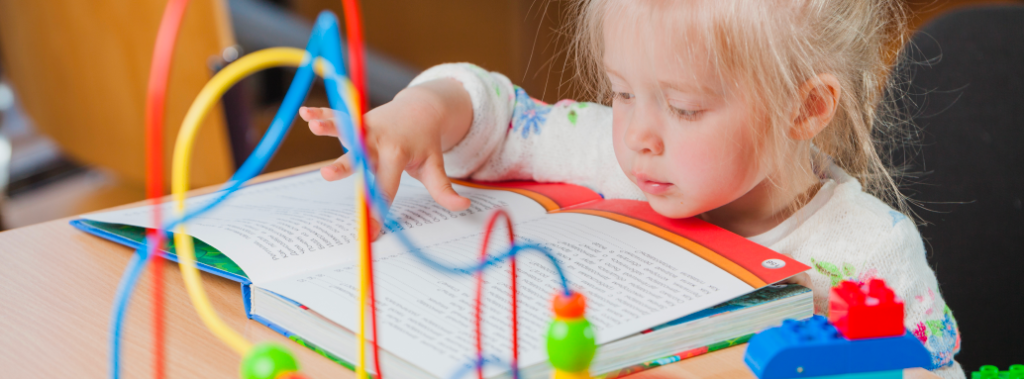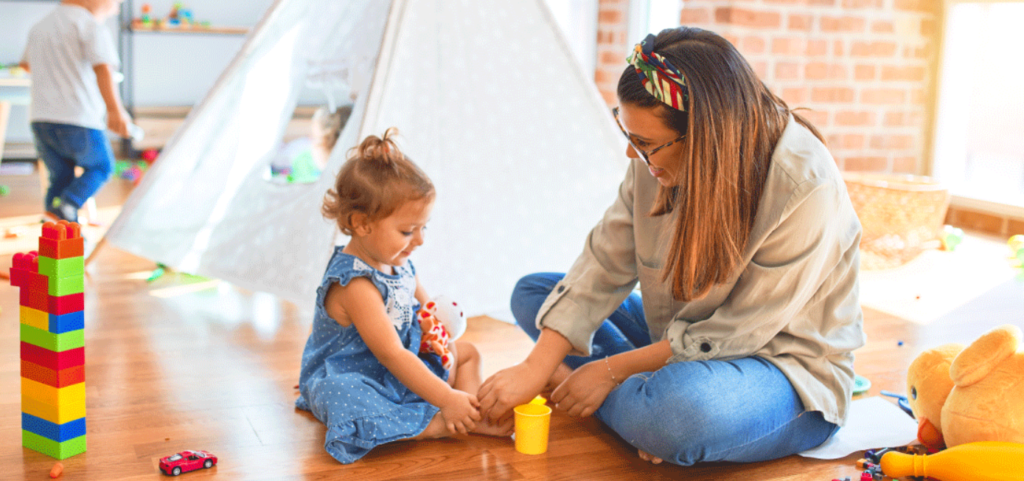
Are you ready to embark on a thrilling journey of Toddler learning with your little one? As your toddler reaches the 10-12 month stage, their curiosity and eagerness to explore the world around them are growing every day. But how can you create a stimulating learning environment at home that supports their cognitive development, fine motor skills, language acquisition, and more?
In this comprehensive guide, I will provide you with age-appropriate activities and valuable tips for fostering your toddler’s learning at home during the 10-12 month stage. From sensory play to Montessori activities, join me as we dive into the fascinating world of early childhood education and discover how you can nurture your child’s development through engaging and educational experiences.
Key Takeaways:
- Discover age-appropriate activities to enhance cognitive development in your toddler.
- Explore the benefits of sensory play and how it can support your child’s overall development.
- Find fun and engaging activities to promote fine motor skills in your toddler.
- Learn strategies to enhance language development and communication skills.
- Discover the principles of Montessori and incorporate them into your daily routines.
The Importance of Toddler learning at home
As a parent, I understand the crucial role I play in my toddler’s early education. During the 10-12 month stage, engaging in learning activities at home becomes even more important for their development. By creating a stimulating learning environment and fostering a love for learning, I can set the foundation for their future educational success.
Early childhood education at home offers countless benefits for toddlers. It allows them to learn at their own pace, explore their interests, and develop vital skills that form the building blocks for future academic and personal growth.
By actively participating in my child’s learning journey, I can ensure that their cognitive, physical, social, and emotional development is nurtured during these crucial months. From language development to problem-solving skills, every aspect of their growth can be positively influenced by the learning experiences I provide.
Creating a Stimulating Learning Environment
One of the key aspects of supporting my toddler’s learning at home is creating a stimulating environment. Through intentional design and organization, I can encourage curiosity, exploration, and engagement. Here are a few tips to consider:
- Designate a dedicated learning area with age-appropriate books, puzzles, and toys
- Expose my child to a variety of sensory experiences through different textures, sounds, and visuals
- Display artwork and visual aids that promote learning and curiosity
- Rotate toys and learning materials to keep their interest and curiosity alive
By incorporating these elements into our home environment, I can create an atmosphere conducive to learning and exploration.

Fostering a Love for Learning
To ensure that my toddler develops a positive attitude toward learning, it is important to foster a love for education from an early age. Here are some practical tips:
- Make learning fun through interactive activities, games, and play
- Follow my child’s interests and incorporate them into their learning experiences
- Read books together and engage in conversations about the stories
- Encourage active participation and celebrate their achievements
By making learning enjoyable and engaging, I can instill a lifelong love for acquiring knowledge in my toddler.
“Education is not the filling of a pail, but the lighting of a fire.” – William Butler Yeats
These words beautifully encapsulate the essence of learning at home. By providing my child with the opportunity to explore, discover, and ignite their curiosity, I am setting the stage for a lifetime of joyful learning.
Cognitive Development Activities
During the 10-12 month stage, cognitive development in toddlers is a crucial aspect of their overall growth. As your little one explores the world around them, it’s important to provide them with age-appropriate activities that promote problem-solving skills, memory, and concentration. Engaging in these activities not only stimulates their cognitive abilities but also helps them develop essential skills for future learning.
“Play is the highest form of research.” – Albert Einstein
To enhance cognitive development in your toddler, consider incorporating educational toys that encourage exploration and critical thinking. Here are some examples of activities and toys that can support your child’s cognitive growth:
Puzzles and Shape Sorters

Introducing simple puzzles and shape sorters can help your toddler improve their problem-solving skills and hand-eye coordination. These toys require them to match shapes and solve puzzles, which stimulates their cognitive abilities and enhances their concentration. Start with puzzles and shape sorters that have larger, chunkier pieces, as they are easier for smaller hands to manipulate.
Stacking and Nesting Toys

Stacking and nesting toys are engaging educational toys that aid in the development of spatial awareness and problem-solving skills. By building towers or nesting objects, toddlers learn about balance, sizes, and how things fit together. Look for toys with bright colors and different textures to make the experience more sensory-rich and enjoyable.
Matching Games

Matching games provide an excellent opportunity for your toddler to improve their memory and cognitive abilities. Choose games that involve matching pairs of objects or pictures. This activity helps them develop their memory recall skills and strengthens their concentration while having playful fun.
| Activity/Toy | Benefits |
|---|---|
| Puzzles and Shape Sorters | Improves problem-solving skills and hand-eye coordination |
| Stacking and Nesting Toys | Develops spatial awareness and problem-solving skills |
| Matching Games | Enhances memory and concentration |
appropriate materials to ensure their safety. Enjoy these engaging and educational activities together!
Language Development Strategies
During the 10-12 month stage, language development in toddlers is rapidly progressing. As a parent, you can play a crucial role in supporting this development and fostering effective communication skills. Here are some strategies to create a language-rich environment for your little one:
- Engaging in Conversation
Talk to your toddler throughout the day, narrating your actions and describing objects or situations. This helps them make connections between words and their meanings. Ask open-ended questions that encourage your child to respond. Even if their response is not yet clear, it shows that they are actively participating in the conversation. - Singing Songs and Nursery Rhymes
Songs and nursery rhymes expose your toddler to rhythm, melody, and repetitive language patterns. Singing together enhances their listening skills and helps them develop phonological awareness, which is essential for speech and language development. There are also books with sounds like the ditty bird series where the book nursery rhymes can be played directly from the book. - Expanding Vocabulary
Introduce new words to your toddler’s vocabulary by labeling objects, pointing out colors, shapes, and describing actions. Use simple and clear language, repeating words and phrases to reinforce their understanding. - Interactive Play
Engage in interactive play activities that involve language, such as playing with dolls or stuffed animals. Encourage pretend play scenarios that require your child to use a variety of words and engage in conversation.
“By creating a language-rich environment and incorporating these strategies into your daily routine, you can support your toddler’s language development and lay a strong foundation for effective communication skills.”
Creating a Daily Routine for Learning

Establishing a daily routine is a valuable way to provide structure and a sense of security for your toddler’s learning journey. By creating a balanced routine that incorporates learning activities, playtime, meals, and rest, you can maximize your child’s learning potential at home during the 10-12 month stage.
Here are some parenting tips to help you craft an effective daily routine:
- Set a consistent schedule: Establishing a consistent daily schedule will help your toddler develop a sense of predictability and stability. Aim to have regular times for waking up, meals, naptime, playtime, and bedtime.
- Include dedicated learning time: Designate specific times during the day for focused learning activities with your toddler. This could include age-appropriate educational games, Storytime, or sensory play activities that promote cognitive development.
- Encourage independent play: Allocate some time in the routine for your toddler to engage in independent play. This allows them to explore their own creativity and problem-solving skills.
- Incorporate active play: Physical activity is important for your toddler’s overall development. Include regular opportunities for active play, both indoors and outdoors, to promote gross motor skills and enhance their learning experience.
- Ensure mealtime interactions: Make mealtimes a social occasion by sitting down together as a family. Engage in conversation, introduce new foods, and encourage self-feeding to support both language development and fine motor skills.
- Prioritize rest and sleep: Adequate sleep is crucial for your toddler’s learning and development. Ensure they have consistent nap times and establish a calming bedtime routine to promote quality sleep.
By following these parenting tips and structuring a daily routine that balances learning, play, rest, and meals, you can create an enriching environment for your toddler’s learning at home during the 10-12 month stage.
Parenting Tips for Successful Learning at Home

As a parent, you have the power to create a positive and supportive learning environment for your toddler at home during the 10-12 month stage. By implementing these parenting tips, you can enhance your child’s educational journey and make the most of this critical phase in their development.
1. Set Realistic Expectations
It’s important to remember that every child develops at their own pace. Set realistic expectations based on your child’s individual progress and abilities. Avoid comparing your toddler to others and celebrate their unique achievements.
2. Incorporate Play-Based Learning
Play is a powerful tool for toddler learning. Make learning fun and engaging by incorporating play-based activities into your daily routine. Choose educational toys, interactive games, and sensory play experiences that promote cognitive, physical, and social development.
3. Follow Your Child’s Interests
Take cues from your toddler’s interests and incorporate them into their learning activities. Whether it’s animals, shapes, or music, tailor your educational materials to align with your child’s passions. This will foster their curiosity and motivation to explore and learn.
4. Establish a Daily Learning Routine
Structure your toddler’s day with a consistent learning routine. Provide dedicated time for interactive play, reading, and hands-on activities. Consistency helps your child feel secure and promotes a sense of accomplishment as they become familiar with their learning schedule.
5. Create a Language-Rich Environment
Talk and sing to your toddler frequently, exposing them to a variety of words and sounds. Read age-appropriate books together and engage in conversation throughout the day. This language-rich environment will support your child’s language development and expand their vocabulary.
6. Encourage Independence
Allow your toddler to explore and accomplish tasks independently. Provide opportunities for self-help skills, such as drinking from a cup or feeding themselves. This promotes their confidence and builds important life skills.
7. Provide a Safe and Organized Learning Space
Create a dedicated space in your home for your toddler’s learning activities. Ensure it is safe and free from distractions. Organize materials in a way that allows your child to access them independently, promoting their sense of responsibility and autonomy.
8. Be Patient and Flexible
Remember that learning is a gradual process. Be patient with your child as they navigate new skills and concepts. Adapt and adjust your approach based on your child’s needs, interests, and learning style.
9. Embrace the Joy of Learning Together
Learning at home is an opportunity for you and your child to bond and explore the world together. Embrace the joy of learning as you witness your toddler’s growth and development. Celebrate every milestone and cherish this special period in your child’s life.
| Parenting Tips for Successful Learning at Home |
|---|
| 1. Set Realistic Expectations |
| 2. Incorporate Play-Based Learning |
| 3. Follow Your Child’s Interests |
| 4. Establish a Daily Learning Routine |
| 5. Create a Language-Rich Environment |
| 6. Encourage Independence |
| 7. Provide a Safe and Organized Learning Space |
| 8. Be Patient and Flexible |
| 9. Embrace the Joy of Learning Together |
Conclusion

In conclusion, engaging in age-appropriate activities and providing a stimulating learning environment at home can greatly contribute to your toddler’s overall development during the 10-12 month stage. By incorporating the strategies and tips outlined in this guide, you’ll be fostering a love for learning and setting a strong foundation for future educational success.
Embrace this exciting stage in your child’s life and enjoy the journey of learning together. Remember, each day is an opportunity to discover, explore, and nurture your toddler’s curious mind. Whether it’s cognitive development activities, engaging sensory play, or promoting language skills, there are plenty of ways to make learning fun and interactive at home.
With the right balance of structured learning, outdoor exploration, and nurturing social interactions, you can create a rich learning environment that meets your toddler’s developmental needs. So, get ready to embark on this incredible learning journey with your little one, and watch as they grow and thrive through the power of play and intentional learning at home.
FAQ
What types of activities can I do at home to promote my toddler’s learning during the 10-12 month stage?
There are several activities you can do with your toddler to promote learning at home. Some examples include reading books, playing with educational toys, engaging in sensory play, and incorporating fine motor skills activities.
How can I enhance my toddler’s cognitive development at home?
You can enhance your toddler’s cognitive development by providing them with age-appropriate puzzles, shape sorters, and other educational toys. Activities like sorting objects by color or shape and playing peek-a-boo can also stimulate their problem-solving skills and memory.
What are some sensory play ideas for my 10-12 month old?
Sensory play is a great way to engage your toddler’s senses and support their development. Some sensory play ideas include water play, playing with textured materials like rice or sand, and exploring different textures through touch and feel books.
How can I help my toddler develop their fine motor skills at home?
There are several activities you can do to help your toddler develop their fine motor skills. Examples include finger painting, stacking blocks, and playing with manipulative toys like LEGO or puzzles.
What can I do at home to encourage my toddler’s language development?
To encourage your toddler’s language development, you can read books aloud, engage in conversation, and label objects and actions in their daily routines. Singing nursery rhymes and playing simple word games can also support their language skills.
What are some Montessori-inspired activities I can incorporate into my toddler’s daily routine?
Montessori activities focus on promoting independence and cognitive development. Some Montessori-inspired activities for toddlers include pouring and transferring objects, practicing practical life skills like buttoning or using a spoon, and engaging in sensory play with natural materials.
How do I create a daily routine for my toddler’s learning at home?
To create a daily routine for your toddler’s learning, start by setting regular times for activities such as reading, playtime, meals, naps, and outdoor exploration. Be flexible and adapt the routine to your toddler’s needs, keeping in mind that play is an important part of their learning experience.
What are the benefits of outdoor learning for my toddler?
Outdoor learning provides numerous benefits for your toddler’s physical and cognitive development. It allows them to explore nature, engage in active play, develop their gross motor skills, and learn about the world around them through firsthand experiences.
How can I nurture my toddler’s social skills during this stage?
While your toddler may have limited interactions with peers during this stage, you can still nurture their social skills. Arrange playdates with other toddlers, engage in virtual interactions, and provide opportunities for sharing and cooperation through activities like taking turns and playing with others.
What are some parenting tips for successful learning at home during the 10-12 month stage?
Some parenting tips for successful learning at home include setting realistic expectations, creating a positive and supportive learning environment, incorporating play-based learning, and following your toddler’s interests and cues. Remember to be patient and enjoy the process of learning together.

